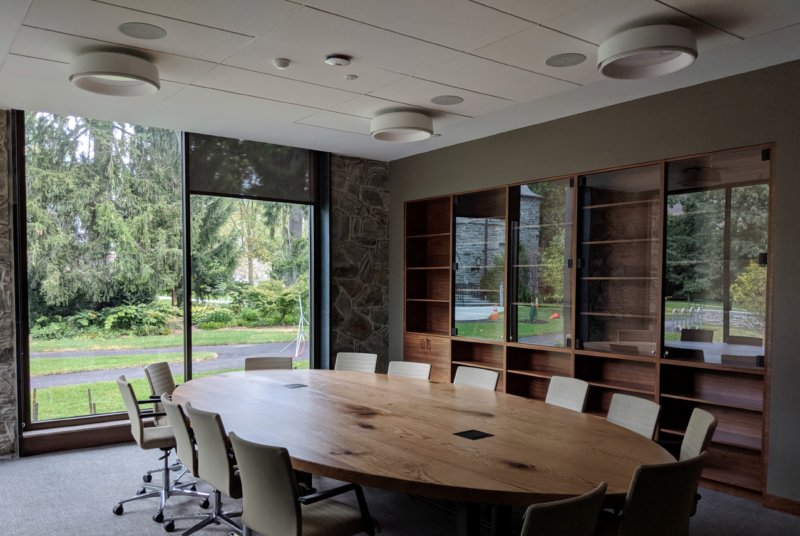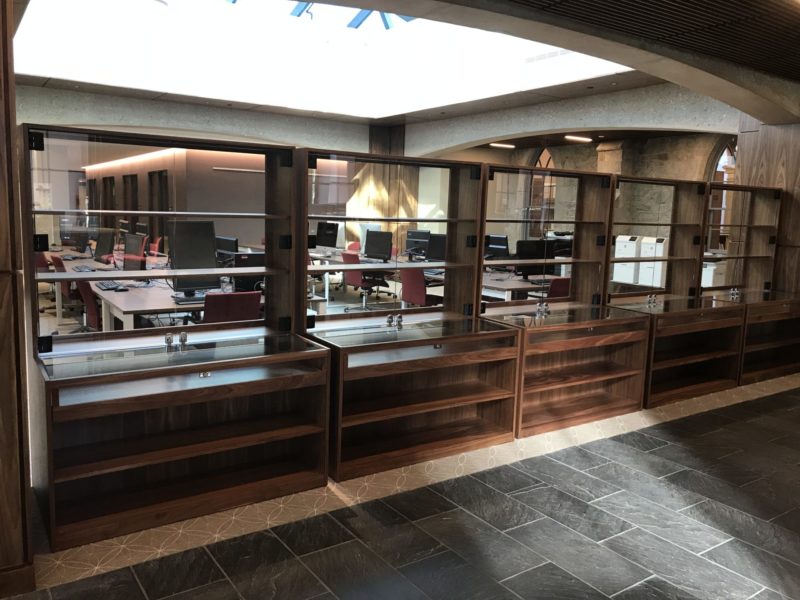Fearless Education: Quaker values, collaboration, and democratized access at Haverford College Quaker & Special Collections
01 October 2019 – Liz Jones-Minsinger
partnerships, archives, teaching, libraries, 2019 archives month series, Quakers, special collections, access
Editors’ Note: This is the first in a series of posts about the intersection of archives and public history that will be published throughout October, or Archives Month in the United States. This series is edited by National Council on Public History (NCPH) board member Krista McCracken, History@Work affiliate editor Kristin O’Brassill-Kulfan, and NCPH The Public Historian co-editor/Digital Media Editor Nicole Belolan.
Haverford College philosophy professor and Quaker historian Rufus M. Jones (1863-1948) argued that the central Quaker principle “called for a fearless education, for there is no safety in individualism, in personal responsibility, or in democracy . . . unless every individual is given a chance to correct his narrow individualism in the light of the experience of larger groups of men.”[1] Haverford is now a non-sectarian institution, but facilitating this kind of “fearless education” remains a critical part of the college’s mission to foster both individual growth and communal values in its students.

Visible storage for special collections materials in one of the Lutnick Library seminar rooms. Photo credit: Todd Shaffer
Haverford College Libraries’ Quaker & Special Collections (QSC) interprets Jones’s charge as a call for more democratic archival access, based on principles of widespread access and cooperative effort. A crucial aspect of providing widespread access to well-curated collections is understanding our own limitations as an institution and pooling resources with other colleges when possible. Haverford College Libraries focus on collecting materials that support current student and faculty research, “necessarily and appropriately leaving comprehensive collecting (except in the case of the Quaker collection) to research libraries.” We have leveraged our more specialized collections by joining several consortia, including Philadelphia Area Consortium of Special Collections Libraries (PACSCL), Pennsylvania Academic Library Consortium, Inc. (PALCI), and OCLC SHARES. These consortia increase the visibility of local collections, facilitate collaborative public programming, and coordinate resource-sharing among member institutions.
Our longest-standing partnership is the Tri-College Consortium (Tri-Co) with nearby Bryn Mawr and Swarthmore colleges. The Consortium not only gives students the opportunity to take classes at partner schools, but it also allows Tri-Co libraries to share their resources. In addition to interlibrary loans of circulating collection material, Special Collections from the three schools loan each other rare books, manuscripts, and archival material for exhibitions and classes.
Building on Tripod, the online library catalog that merges the collections of the three colleges, Tri-Co has adopted a collaborative model for its digital initiatives and provides shared finding aid access for Special Collections materials. Special Collections and Digital Scholarship staff at the three colleges often cooperate on digital projects, such as Beyond Penn’s Treaty: Quaker and American Indian Relations. Haverford Quaker & Special Collections and the Friends Historical Library of Swarthmore College both serve as the depository for the Baltimore Yearly Meeting and Philadelphia Yearly Meeting records of the Society of Friends, making collaboration between staff at the two institutions even more critical.
Haverford’s long tradition of student-faculty research collaboration and emphasis on co-curricular learning have greatly influenced QSC’s interactions with students as both researchers and colleagues. As a small, undergraduate institution, Haverford encourages its students to work closely with faculty and library staff to produce original research. All students complete a senior thesis project as part of their academic program and many conduct research in the manuscript and archival collections. QSC staff provide support for numerous class sessions each year and help students cultivate the archival intelligence they need to navigate a major research project.[2]
Students also work alongside QSC staff as colleagues, processing manuscripts and archival collections and creating finding aids to provide greater access to collections. Students who process archival materials gain a greater understanding of how primary sources are mediated through interpretive lenses, learn how to write for different audiences, and contribute substantially to research and scholarship.
Haverford’s co-curricular model, which emphasizes activities and programs that complement what students learn in the classroom, is especially evident in the libraries’ exhibition program. Starting in 2012, the libraries began a move towards student- and class-run exhibits. Student curators are offered support with research, goal setting, and exhibit design and installation by members of the libraries’ staff. Past exhibit topics have featured topics such as astronomy, mental health, pacifism, and the American Friends Service Committee. Curators are challenged to convey complex ideas in a concise manner to a wide audience, provide historical context, and carefully choose materials to build a narrative. This experience expands students’ understanding of what a scholarly project can be and provides an opportunity for in-depth engagement with primary sources and artifacts.
Finally, a twenty-month-long renovation to Haverford’s Lutnick Library has given us the opportunity to improve engagement with Special Collections materials and foster collaborative scholarship. We have increased the gallery space available for student-, class-, and staff-run exhibitions. The opening exhibit in the Rebecca & Rick White Gallery will be curated by a rising senior who completed an 11-week summer internship researching a recent gift of incunabula; the spring exhibit will be curated by a first-year writing seminar class.

Gallery space by the second level entrance to Lutnick Library. This space will feature rotating exhibits of library materials. Photo credit: Liz Jones-Minsinger
In addition, the second level of the library offers a dedicated classroom for QSC and Digital Scholarship staff to use in instruction, as well as hanging space for students to create pop-up poster sessions and exhibits of their own materials. In keeping with the model of widespread access, Lutnick Library seminar rooms have been designed to include visible storage. These spaces will allow instructors to make Quaker & Special Collections materials accessible to students throughout the semester, encouraging long-term engagement with archival materials. We believe these design choices will break down some of the traditional barriers to archival access and encourage students to pursue their research interests both inside and outside the classroom.
The democratic archive will always be a work in progress, subject to technological, social, and economic barriers to be overcome. However, by drawing on traditions of student-faculty research collaboration and intercollegiate cooperation with Swarthmore and Bryn Mawr colleges, we believe we can encourage a broader audience to participate in the making and remaking of our collective past.
~Liz Jones-Minsinger is the College Archivist and Records Manager at Haverford College. She wishes to thank Sarah Horowitz and Mary Crauderueff for their assistance with this post.
[1] Rufus M. Jones, The Quakers in the American Colonies (London: MacMillian & Co., 1911), xxvi.
[2] During the 2017-2018 academic year, Haverford College subject librarians taught 217 class sessions and Quaker & Special Collections staff provided support to 60 class sessions. https://www.haverford.edu/sites/default/files/Office/Library/Annual-Report-2017-2018.pdf



